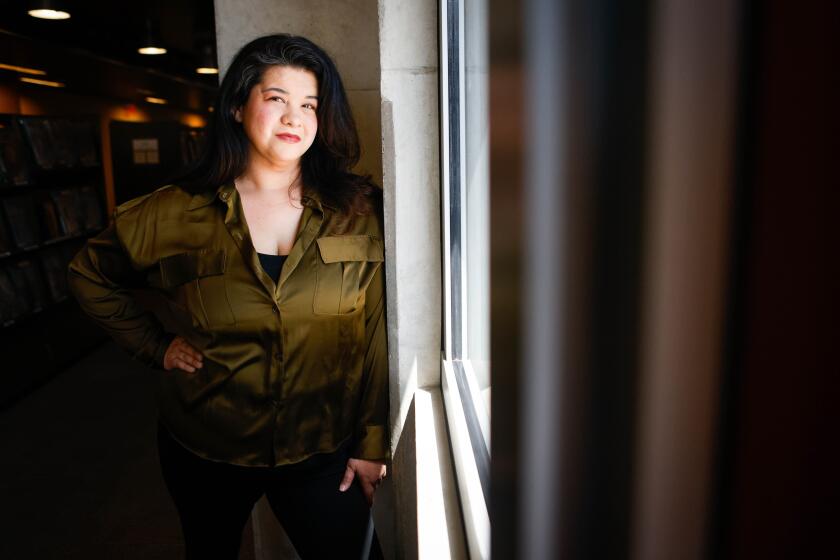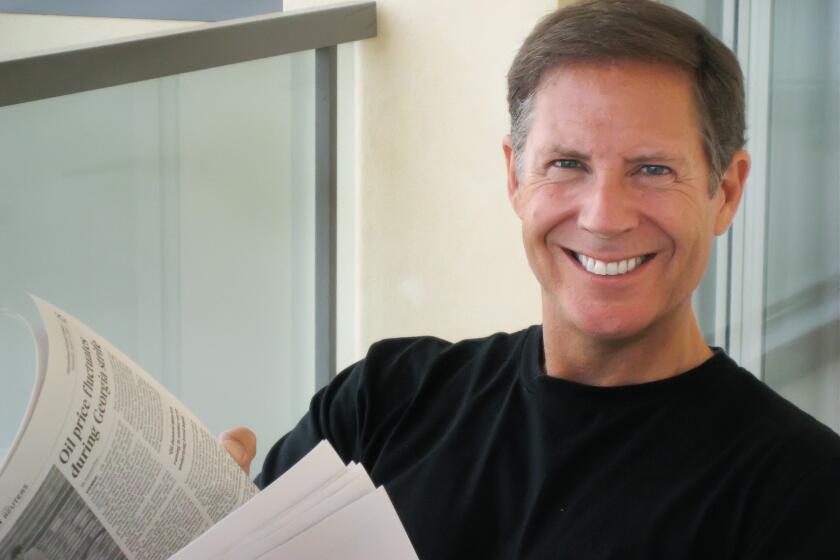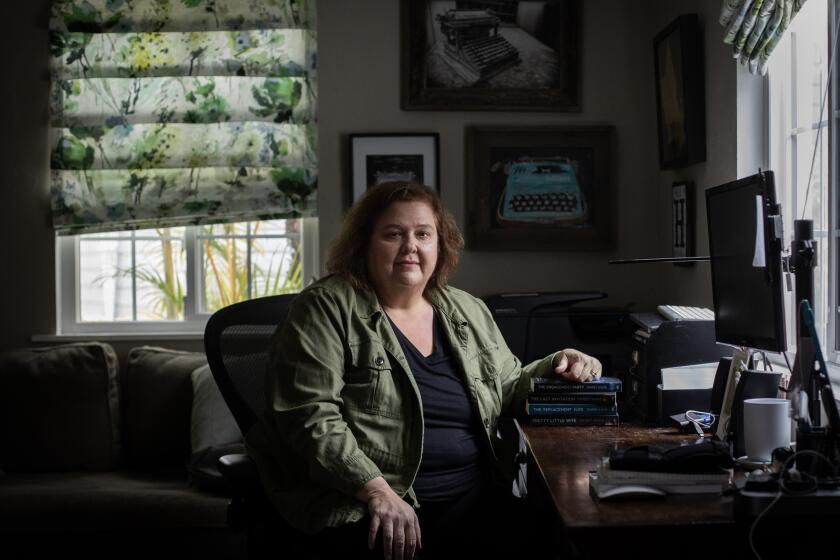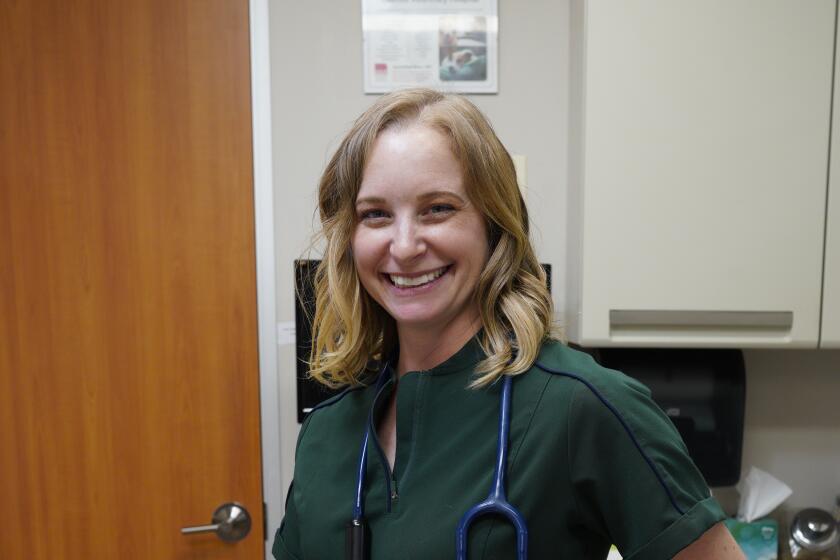Winter of her discontents: In ‘All’s Well,’ Mona Awad crafts a Shakespearean tragicomedy
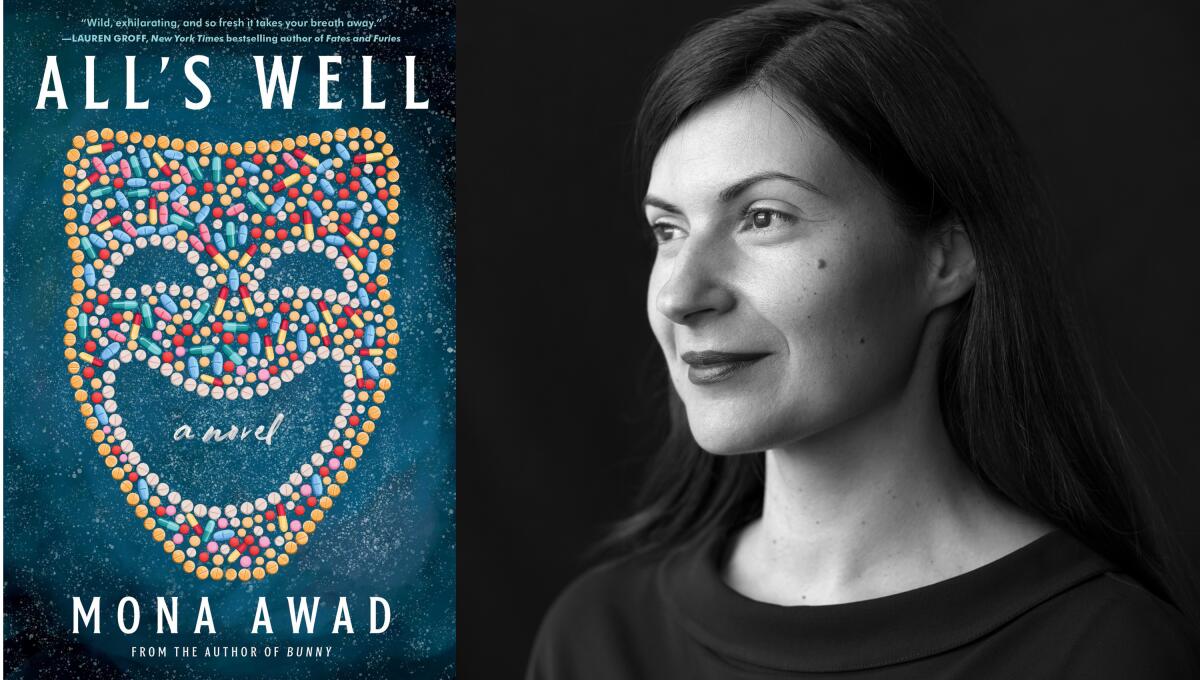
Author talks about how a sojourn in San Diego is exactly what she needed to finish her third novel
“There’s something about the sunniness of San Diego that always brings out the darkness in me too.”
To hear Mona Awad tell it, a sojourn in San Diego is exactly what she needed to finish her third novel, “All’s Well” (Simon & Schuster). A darkly comic tale of a once aspiring actor-turned-college theater director dealing with chronic pain, the book is mainly set in an unnamed town somewhere on the coast of New England.
And while Awad admits that it does seem “odd” that the book was mostly written on one coast, but takes place in another, she says the majority of the book’s tone is all San Diego.
“The sunniness, the movement toward the sunshine, the sea and the troubling ecstasy, that’s all San Diego,” says Awad, who rented a seaside Airbnb in La Jolla after taking a semester off from her teaching job at Syracuse University.
“It was the most incredible creative experience I’ve ever had, really,” she continues. “The book just sort of unfolded when I got there. I wrote it all there in the span of a month. The natural beauty of the place definitely helped shape the book. It makes me remember the book not just as a book, but a place as well, because it was such a magical experience.”
This magic extends to the story that unfolds in “All’s Well.” The book’s protagonist, Miranda Fitch, is physically and mentally stifled after a series of unfortunate events. Her acting career is washed up, her divorce was unpleasant and, most pressingly, there’s the on-stage accident and botched surgery that has left her with chronic back pain and dependent on painkillers. Then, just as it seems as if she’s given up entirely and on the verge of losing her teaching job, she is visited by three mysterious benefactors and, suddenly, things take a fantastic and fantastical turn for the better.
“The first third of the book is filled with this New England, wintry despair,” says Awad, who would often walk alone along the La Jolla coast multiple times a day, listening to productions of “Macbeth,” for inspiration. “The book starts in the winter during the school theater season. So it starts in the winter in New England and Miranda’s in terrible pain on the floor, and then things begin to shift because it’s a comedy ultimately. So the trajectory shifts upward toward the spring, toward the sun, and her experience shifts with it.”
There are Shakespearean dualities throughout “All’s Well.” Of course there’s the title of the book, a cheeky reference to both the play that Miranda is attempting to stage (“All’s Well That Ends Well”) and the state of her physical health. However, there’s also the fact that it’s long been debated whether the titular Shakespeare play was a comedy or a tragedy. And just as with Shakespeare’s character of Helen, Miranda is a comically tragic character that can’t seem to catch a break.
“The onstage production in the book is obviously ‘All’s Well That Ends Well’ because that’s the play, the life and the story that Miranda wants for herself,” says Awad, who incorporated some of her own experiences living with chronic pain for the character of Miranda. “But then there’s the play that she’s forced to live, the one she doesn’t want, which is ‘Macbeth.’”
Along with Miranda’s rebellious students, there’s also her unrequited fixation on Hugo, a set designer who has parallels with Count Bertram in Shakespeare’s “All’s Well.”
“Part of the reason why I think ‘All’s Well That Ends Well’ is so disturbing, strange and compelling is because Helen, the lead character, is so interesting,” Awad says. “She’s so witchy, clever and enterprising, and yet, she’s fixated on this guy who doesn’t like her. She moves heaven and earth, she turns the world of the play upside down, just so she can get this man. There’s just something about that improbable, irrational attraction that was just so compelling to me.”
For Awad, that attraction to the improbable and irrational seems to have always been there. She grew up in Montreal and Mississauga, Canada (the latter of which Awad jokingly refers to as “misery saga” in her first novel, “13 Ways of Looking at a Fat Girl”) and says that writing magical stories was her way of escaping.
“I was always a shy kid and didn’t always feel comfortable speaking, but I had a lot of feelings about things that that I saw,” Awad recalls. “I was imaginative, but fearful of a lot of things, so my head would always be spinning these crazy stories. So writing became a place of freedom and agency, of power.”
While her mother loved a good thriller, Awad says she was always much more attracted to stories that incorporated magical realism into the plot. She published an essay in Vogue this year, where she recounted how films such as “The Wizard of Oz” helped her cope with a largely absent father.
“I’ve always felt that concrete reality, if I were to tell that story, I wouldn’t be telling the full truth as I experienced it,” says Awad, whose previous two novels also incorporated fantastical elements. “That’s why I love ‘The Wizard of Oz,’ because it’s an exploration of the truth of someone’s heart as opposed to just the truth. In order to tell that kind of truth, I’d like magic and possibility and wonder to be there.”
That specific brand of truth is evident throughout “All’s Well.” Awad is a talented enough writer to where she could have simply crafted a relatable, straightforward narrative about a woman in pain and down on her luck. Instead, she has written something far more exciting: a mystical journey complete with spectral benefactors, mysterious curses and limitless magic. Something the Bard would’ve been proud of.
“There’s something about playing with what’s possible,” Awad says. “There’s something about introducing magic and the supernatural that, for me, when I’m recounting a story, makes it feel more psychologically and emotionally truthful.”
“All’s Well” by Mona Awad (Simon & Schuster, 2021; 368 pages)
Warwick’s presents Mona Awad
When: 4 p.m. Tuesday
Where: Virtual event through Warwick’s
Tickets: Free
Online: warwicks.com
Combs is a freelance writer.
Get U-T Arts & Culture on Thursdays
A San Diego insider’s look at what talented artists are bringing to the stage, screen, galleries and more.
You may occasionally receive promotional content from the San Diego Union-Tribune.
